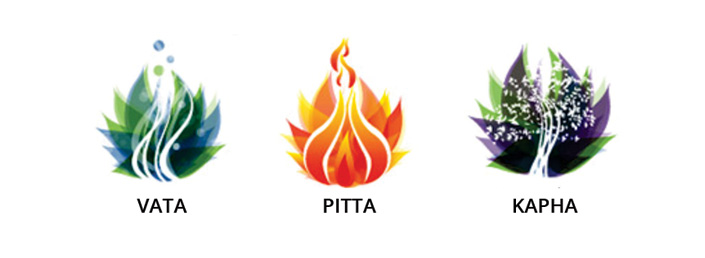: +91 98721 10777
Our body is constituted of “panchabhuta” or five elements of nature: air, water, earth, space and fire. Out of these elements derive the three Ayurvedic doshas: Vata, Pitta and Kapha. Vata is composed of space and air, Pitta of fire and water, and Kapha of earth and water.
In simple words, Vata refers to gas, Pitta to bile and Kapha to mucus. Balance of the three ensures complete state of physical and mental well-being.

Often called the King of the Doshas, Vata is the force governing all biological activity, and almost 70% of diseases in human body are due to Vata imbalance.
An individual with predominant Vata dosha has physical and mental characteristics that reflect these qualities.
People with balanced Vata are creative and active. However, when Vata is aggravated the positive qualities get eclipsed. Common symptoms of Vata imbalance include flatulence, constipation, joint pains, arthritis, weakness, stiffness, fatigue, forgetfulness and skin disease. Colon, thighs, bones, joints, ears, skin, etc. are the areas where Vata manifest in the body.
Pitta derives from the elements of fire and water and in layman’s language it refers to bile. This dosha controls the energy of digestion and metabolism in the body.
An individual with predominant Pitta dosha has physical and mental characteristics that reflect these qualities.
Pitta people are outspoken, intellectual and good decision makers. Pitta imbalance however eclipses these positive characteristics, making them short-tempered and argumentative. Just as you can’t carry on with an overheated car, the internal fire of the body must be kept in control.
Small intestine, stomach, liver, blood, eyes, sweat are some of the areas where Pitta manifest in the body. Infection, inflammation, rashes, piles, pimples, nosebleeding, loose motions, overheating of body and fever are usually due to Pitta imbalance.
Kapha derives from the elements of earth and water and simply refers to mucus. It governs the physical form and structure of our body and protects us from various diseases.
An individual with predominant Kapha dosha has physical and mental characteristics that reflect these qualities.
Chest, throat, lungs, head, etc. are the main areas where Kapha manifests. Cold, cough, sinus congestion, obesity, vomiting, water retention and poor digestion are some of the major symptoms of Kapha imbalance. Bad Kapha weighs down the body and clouds the mind.
Foods that are high in fat content like daily products and oils should be avoided when suffering from Kapha imbalance. Overeating aggravates Kapha.
Foods like turmeric, black pepper, raisins, ginger, dry ginger (saunth), honey and cinnamon help pacify Kapha dosha.